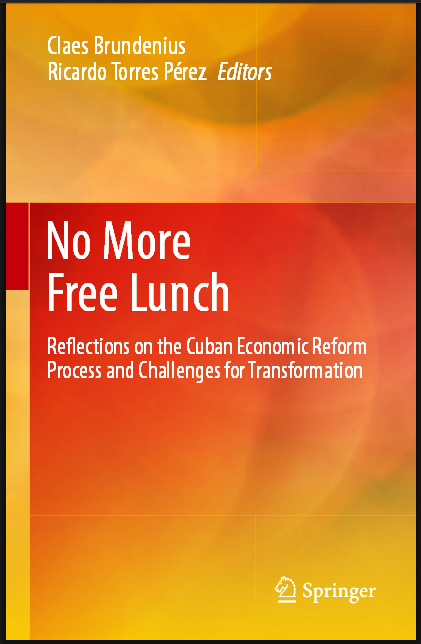Claes Brundenius and Ricardo Torres Pérez have recently produced a volume of essays on Cuba’s economic reform process entitled No More Free Lunch: Reflections on the Cuban Economic Reform Process and Challenges for Transformation and published by Springer; Publishers. (2014. Hardcover: pp. 250; ISBN-10: 3319009176 )
This note does not constitute a Review of the book as one of the chapters was written by me. Instead, this is meant as a Presentation of the volume. As can be seen from the Table of Contents, the book includes analyses on a number of the central issues confronting Cuba’s economic reform process.
The publisher’s Web Site and the page for the book are located here: http://link.springer.com/book/10.1007/978-3-319-00918-6#
The Front Matter is available here: http://download.springer.com/static/pdf/355/bfm%253A978-3-319-00918- 6%252F1.pdf?auth66=1389296888_83e5a5a86df2ed875567195285979ec2&ext=.pdf
Table of Contents
Chapter 1 Introduction, Claes Brundenius Lund University and Ricardo Torres Pérez, University of Havana
Chapter 2 Structural Problems and Changes in Cuba’s Economic Model, Ricardo Torres Pérez, University of Havana
Chapter 3 The Economic Transformation Process after 2011, Oscar Fernandez Estrada University of Havana
Chapter 4 Current Problems in the Cuban Economy and Necessary Reforms, Mauricio de Miranda, Pontifica Universidad Javeriana Cali, Colombia
Chapter 5 Monetary and Financial Challenges in Cuba: Lessons from Vietnam, Pavel Vidal, University of Havana
Chapter 6 Food Production and Import Substitution in the Cuban Reform Process, Anicia García, University of Havana
Chapter 7 Cuba’s ‘Apertura’ to Small Enterprise, Archibald Ritter, Carleton University
Chapter8. Innovation, Entrepreneurship and SMEs: What Cuba can Learn from the Vietnamese Reform Process, Claes Brundenius, Lund University and Le Dang Doanh, University of Hanoi
Chapter 9. Science, Technology, Innovation Policies and the Innovation System in Cuba: Assessment and Prospects, Jorge Nunez Jover and Luis F. Montalvo Arriete, University of Havana
Chapter 10 Foreign Direct Investments in Cuba and Vietnam: Lessons Learned, Omar Everleny Perez Villanueva, University of Havana
Chapter 11 Non-State Socially Responsible Enterprise: Local Development: The Key to Inclusive Economic Growth in Cuba, Julia Sagebien, Dalhousie University and Rafael Betancourt, University of Havana
Chapter 12 Concluding Reflections on the Current Reforms, Ricardo Torres Pérez, University of Havana
Chapter 13 Moving from Reacting to an External Shock: Towards Shaping an new Conception of Cuban Socialism, Juan Triana Cordovi, University of Havana
Chapter 14 Without Sugarcane there is No Cuba: What Should We Do Now?, Pedro Monreal Gonzalez, UNESCO, Jamaica
Chapter 15 Reflections on the Cuban Model and the reform Process, Claes Brundenius Lund University
From the Back Cover
In September 2010, the Cuban government decided to embark on an economic reform program, unprecedented after the Revolution in 1959. This opened up opportunities for Cuban economists and scholars to participate in the development of the reform program. Thanks to grants from SSRC (Social Sciences Research Council, New York) and the Norwegian Ministry of Foreign Affairs, several researchers from the Cuban think tank CEEC (Center for Studies of the Cuban Economy, Havana) got an opportunity to visit countries that could be of interest for the reform process, notably Vietnam, but also Brazil, South Africa and Norway.
The result of these field visits and a subsequent workshop involving contributions from Cuban as well as non-Cuban scholars, this volume showcases unprecedented new insights into the process and prospects for reform along many dimensions, including foreign direct investment, import substitution, entrepreneurship and business creation, science and technology development, and fiscal policies. The resulting analysis, in a comparative perspective, provides a framework for future research as well as for business practice and policymaking.
About the Authors
Claes Brundenius is Honorary Professor at the Research Policy Institute (RPI), Lund University, Sweden. He holds a PhD in Economic History from Lund University. Before joining the staff at RPI he was attached to the OECD Directorate for Scientific Affairs in Paris. He has been a Guest Professor at Pittsburgh University (1984) and Smith College (1987), USA. Between 1997 and 2003 he was Senior Researcher at the Centre for Development Research in Copenhagen. His main interest is research and policy studies on the role and impact of Science, Technology and Innovation policies and strategies in developing countries. His current work has focused on policy analysis of technological change and knowledge based development in developing and transition economies, notably in Latin America and the Caribbean, East Asia, and Southern Africa (SADC). His latest book (co-editor with Bo Göransson) is Universities in Transition – The Changing Role and Challenges for Academic Institutions (Springer, New York, 2011).
Ricardo Torres Pérez holds a PhD in Economic Sciences from the University of Havana. He is currently associate professor with the Centro de Estudios de la Economía Cubana (CEEC) at the University of Havana. He was a government scholar at Hitotsubashi University in Japan (2007-2009) and visiting researcher at Harvard University and the Ohio State University (2012). He has published in the Harvard International Review and has chapters in several books, including “Cincuenta años de la economía cubana” (Editorial Ciencias Sociales, Havana, 2010) and “Cuba: hacia una estrategia de desarrollo para los inicios del siglo XXI” (Editorial Universidad Javeriana de Cali, 2012).


